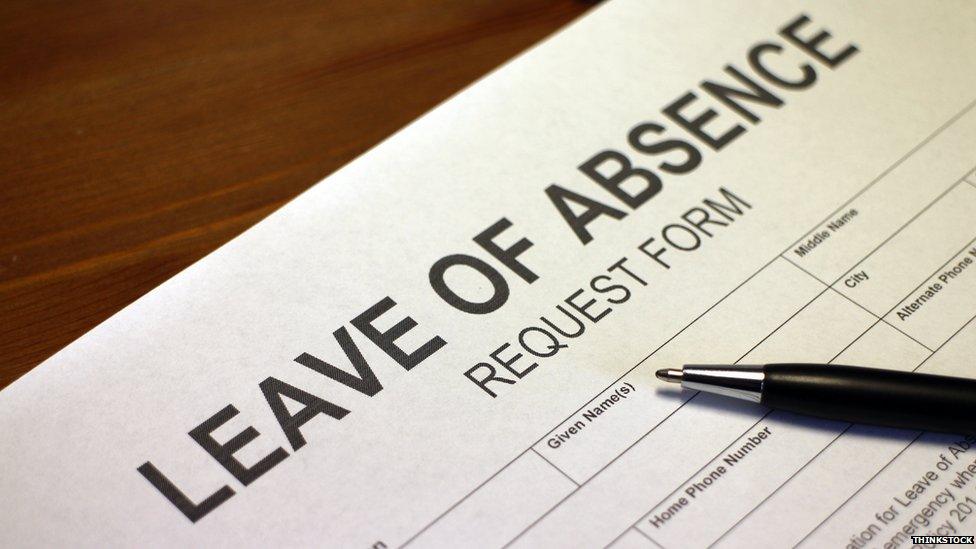Under 25 and pregnant - know your work rights
- Published

Mums-to-be who are under 25 are being urged to find out more about their working rights.
A report shows younger pregnant women are significantly more likely to suffer discrimination at work than older women.
The Equality and Human Rights Commission, which aims to protect legal rights, suggests around 6% of under-25s were let go from jobs after telling bosses they were pregnant. That compares with an average of 1% for all women.
The report also claims under-25s are often given unsuitable workloads, discouraged from attending antenatal appointments and suffer from more stress than other expectant mothers.
Midwives argue women who don't make appointments miss out on essential medical tests and valuable advice around smoking and nutrition.
So, pregnant women of any age - these are your rights.
Paid time off for antenatal care
If you have a medical appointment, your boss has to let you go and pay you just the same.
That includes antenatal or parenting classes if they've been recommended by a doctor or midwife.
You can't do this unless you've told your boss you're pregnant.
Your baby's dad or your partner also has the right to time off for two antenatal appointments, but that doesn't have to be paid.

Maternity leave
Statutory Maternity Leave (the minimum you are legally entitled to) is 52 weeks.
You don't have to take all 52 weeks but you must take two weeks off after your baby is born, or four weeks if you work in a factory.
You'll only get this leave if you're an employee. Check if you're not sure, external.
You also have to give your employer at least 15 weeks notice (or as much as possible if you didn't know you were pregnant) before your due date if you want maternity leave.
You'll have to let them know when you want your leave to start but usually the earliest is 11 weeks before you're due, or the day after the birth if baby comes early.

It doesn't matter how long you've been with your employer, how many hours you work or how much you get paid.
Your employment rights are protected on Statutory Maternity Leave. This includes your right to pay rises, build up holiday and return to work.
You could also be entitled to take some of your leave as Shared Parental Leave, external and partners and/or father's may get paternal leave.
You'll need to give eight weeks notice if you want to change your return date.
Maternity pay
Statutory Maternity Leave (SMP) is paid for up to 39 weeks. You get 90% of your average weekly earnings for the first six weeks.
After that you get £139.58 or 90% of your average weekly earnings (whichever is lower) for the 33 weeks.
To get it, you'll have to earn at least £112 a week on average, give the correct notice and give proof you're pregnant.
You'll also have to have worked for your employer continuously for at least 26 weeks up to the 15th week before you're due.
You need to give at least 28 days notice before the day you want it to start (and in writing if that's how your boss wants it).
They need to confirm within 28 days how much SMP you'll get and when it will start and stop.
If they decide you're not eligible, they need to give you a special form within seven days of making their decision and explain why.

If you're not eligible, you may be able to claim a maternity allowance, external.
Both maternity leave and pay start automatically if you're off work with an illness linked to your pregnancy in the four weeks before the week your baby's due.
But don't go getting yourself into police custody during this time - or your pay will be stopped.
Protection against unfair treatment, discrimination or dismissal
Employers can't change your contract without agreement - if they do they are in breach of contract. So, they can't sack you because you're pregnant.
They also need to do a risk assessment, to try to avoid harm to you or your unborn baby.
This looks at things like heavy lifting or carrying, standing or sitting for long periods without proper breaks and long working hours.
They should then take reasonable steps to remove the risks, or suspend you on full pay if they can't - or offer alternative work.
You also have the right to return to your old job after your leave, unless you take more than 26 weeks.
In that case, you still have the right to return to your old job unless it's not reasonably and practically do-able for your employer.
Instead, they need to offer you appropriate similar employment, on no less favourable terms.
Find us on Instagram at BBCNewsbeat, external and follow us on Snapchat, search for bbc_newsbeat